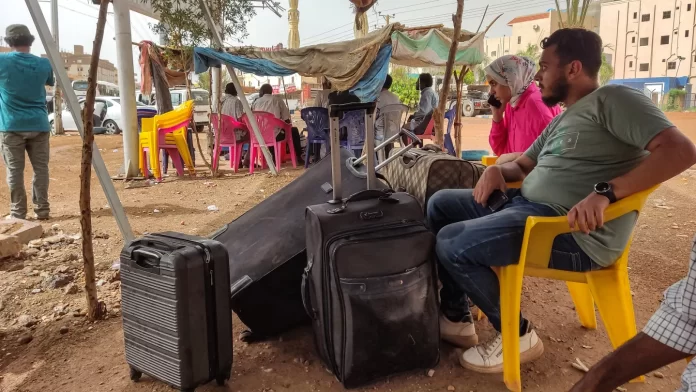The United Nations has cautioned that the continuous battle in Sudan will prompt “further relocation” of individuals, who will gamble with perilous streets to escape the brutality and look for shelter in South Sudan, Egypt, and Chad, which are neighboring nations.
The UN Displaced person Organization (UNHCR) cautioned on Tuesday that more individuals are supposed to leave the country for Chad and South Sudan, as they are confronting intense deficiencies of food, water, meds, and fuel in the capital Khartoum.
ALSO READ: Air Peace is ready to evacuate Nigerians from Sudan for free
Olga Sarrado, a spokesperson for the UNHCR, stated on Tuesday that “the fighting looks set to trigger further displacement both within and outside the country.”
At least 20,000 Sudanese have fled into Chad since the fighting started in the middle of April, and 4,000 South Sudanese refugees who had been living in Sudan have returned to their home country, according to Sarrado, who said that the number could rise.
Over 800,000 South Sudanese refugees reside in Sudan, with a quarter of them residing in Khartoum, directly impacted by the conflict.
According to the UNHCR, Sudan is home to 1.1 million refugees in total.
State media in Egypt’s neighborhood has reported that more than 3,000 individuals have entered Egypt since the fighting began. However, the number of individuals who have already entered the country has not been confirmed by authorities.
58,995 Sudanese refugees are currently registered in Egypt with the UNHCR.
In the meantime, some men trying to enter Egypt from Sudan are said to be being asked for visas by Egypt’s border control, according to reports.
“The Egyptian authorities have not officially announced any information regarding who can enter the country without a visa, who cannot, or how to obtain one; Nour Khalil, director of the Refugees Platform in Egypt, stated, “They have not announced or clarified the measures to apply for asylum at the border crossings, nor have they explained the procedures.”
He continued, “Women, children, and men under the age of 16 and over 50 can cross without a visa.”
In the meantime, the UN’s humanitarian office, OCHA, issued a warning that prices for basic goods were skyrocketing and that supply shortages were getting worse all around Khartoum.
According to OCHA, “After 10 days of fighting, shortages of food, water, medicines, and fuel are becoming extremely acute, especially in Khartoum and surrounding areas.”
It also cited reports that basic goods had become more expensive, that the cost of bottled water had doubled, and that it was hard to get cash.
“Reports of rapidly rising transportation costs, making it increasingly difficult for people to leave conflict-affected areas,” was mentioned in a report. It stated that cash is hard to come by and scarce.
On Monday, the armies and paramilitary Rapid Support Forces (RSF) of Sudan agreed to a 72-hour ceasefire through our mediation. Omdurman, Khartoum’s twin city, still has reports of heavy artillery and gunfire.













